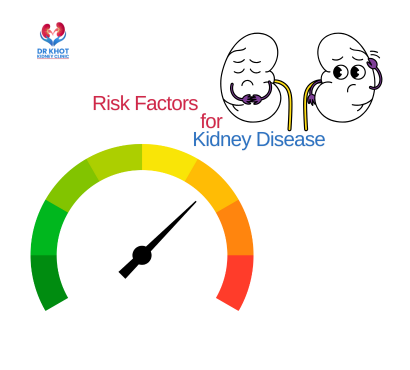Kidneys play a crucial role in maintaining our overall health. They filter waste, balance fluids, regulate blood pressure, and produce hormones. Yet, many people remain unaware of the risks that could silently damage these vital organs. In India, the number of people diagnosed with chronic kidney disease (CKD) has grown significantly due to rising cases of diabetes, hypertension, and unhealthy lifestyles.
This blog dives deep into the top 10 risk factors for kidney disease you should not ignore, along with tips on how to reduce your chances of developing CKD.
What is Kidney Disease?
Kidney disease occurs when the kidneys lose their ability to function properly. This may be due to sudden injury (acute kidney injury) or a gradual loss of function (chronic kidney disease).
Chronic Kidney Disease (CKD) is particularly concerning because it progresses slowly and often without symptoms until significant damage has occurred.
Top 10 Risk Factors for Kidney Disease
1. Diabetes (Type 1 and Type 2)
- Diabetes is the leading cause of kidney failure in India.
- High blood sugar damages the blood vessels in the kidneys, impairing their filtering function.
- Early detection through urine and blood tests is crucial.
2. Hypertension (High Blood Pressure)
- Elevated blood pressure puts strain on kidney blood vessels.
- Uncontrolled hypertension accelerates kidney damage over time.
- Regular BP monitoring and medication adherence are vital.
3. Family History of Kidney Disease
- Genetic predisposition can increase your risk.
- If a parent or sibling has kidney disease, you should undergo regular screenings.
4. Obesity
- Obesity contributes to diabetes and hypertension, both risk factors for kidney disease.
- It also causes inflammation and hormonal changes that can damage kidneys.
5. Smoking
- Smoking reduces blood flow to the kidneys, reducing their ability to function properly.
- It also worsens existing health conditions that affect kidneys.
6. Heart Disease
- Cardiovascular disease and kidney disease are closely linked.
- Heart failure can lead to reduced kidney perfusion, causing long-term damage.
7. Age (Above 60 Years)
- Natural aging leads to a decline in kidney function.
- Elderly individuals are also more likely to have comorbid conditions like diabetes and hypertension.
8. Frequent Use of Painkillers
- Long-term use of NSAIDs (like ibuprofen and diclofenac) harms kidney tissues.
- Always consult a doctor before taking any over-the-counter pain medication regularly.
9. Dehydration and Low Water Intake
- Chronic dehydration reduces kidney function.
- Adequate water helps kidneys flush out toxins effectively.
10. Uncontrolled or Untreated Urinary Tract Infections (UTIs)
- Repeated or severe UTIs can lead to kidney infections (pyelonephritis).
- Ignoring UTI symptoms or incomplete antibiotic courses increases risk.
Early Warning Signs to Watch For
Kidney disease often shows no symptoms until it’s advanced. But early signs may include:
- Swelling in feet and ankles
- Fatigue or weakness
- Trouble sleeping
- Frequent urination, especially at night
- Blood in urine
- Foamy or bubbly urine
- Difficulty concentrating
Who is at Higher Risk in India?
- People with diabetes or high BP (especially in urban India)
- Individuals with a sedentary lifestyle
- Those with limited access to healthcare or screening services
- Elderly population in rural areas with untreated conditions
Preventive Measures for Kidney Health
You can take the following steps to lower your risk of kidney disease:
1. Manage Blood Sugar and Blood Pressure
- Monitor regularly and follow medical advice.
- Use medications as prescribed.
2. Eat a Kidney-Friendly Diet
- Low sodium, low fat, high in fiber and hydration.
- Limit processed foods and excess protein.
3. Exercise Regularly
- 30 minutes of walking, yoga, or swimming can help control weight and BP.
4. Stay Hydrated
- Drink 2–3 liters of water per day (unless medically restricted).
5. Avoid Smoking and Alcohol
- These habits worsen kidney function and overall health.
6. Get Regular Health Check-Ups
- Especially important if you have a family history or chronic illness.
7. Limit Painkiller Use
- Avoid self-medication for chronic aches.
Kidney disease is often silent until it’s severe. However, by understanding the top risk factors and taking preventive action, you can protect your kidneys and live a healthier life. In India, where lifestyle diseases are on the rise, public awareness and regular screening are the keys to tackling the CKD epidemic.
If you’re at risk or experiencing symptoms, consult a nephrologist or general physician and get tested early. Prevention is always better than cure when it comes to kidney health.
FAQs
Q1. How often should kidney function be tested?
If you have risk factors like diabetes or hypertension, get tested annually. Otherwise, once every 2–3 years after age 40 is advisable.
Q2. Is kidney disease reversible?
Acute kidney disease may be reversible with early treatment, but chronic kidney disease is usually progressive. Early detection helps slow the damage.
Q3. Can drinking more water prevent kidney disease?
While hydration is essential, it won’t prevent kidney disease caused by conditions like diabetes or high BP. However, it does support overall kidney function.

